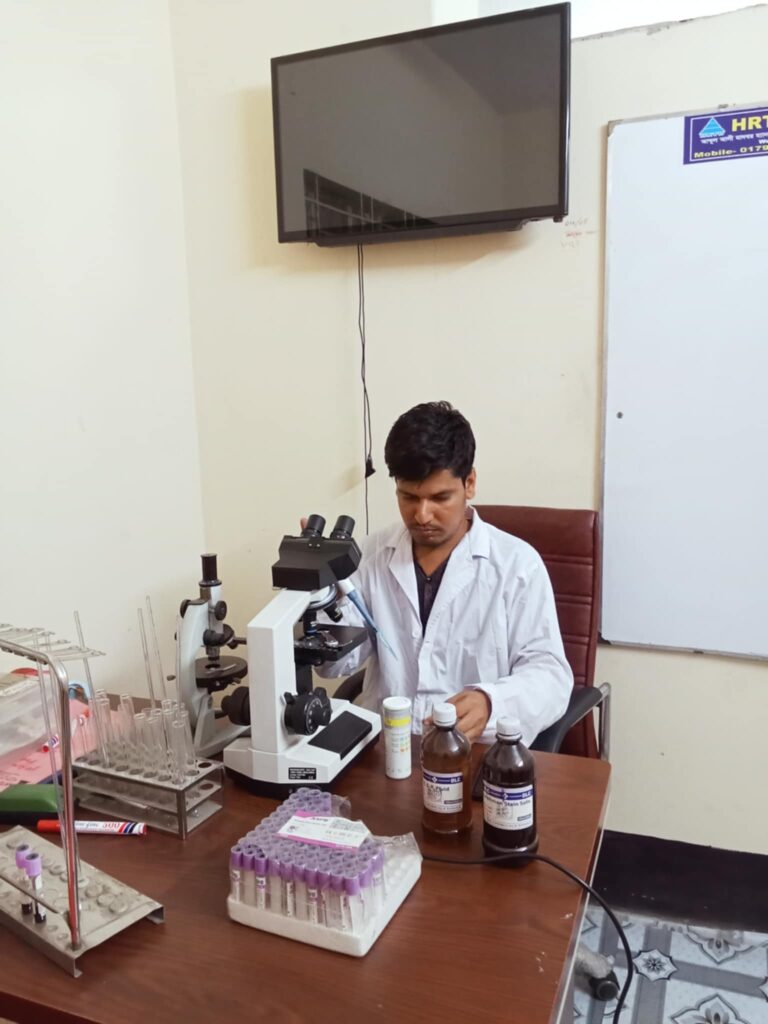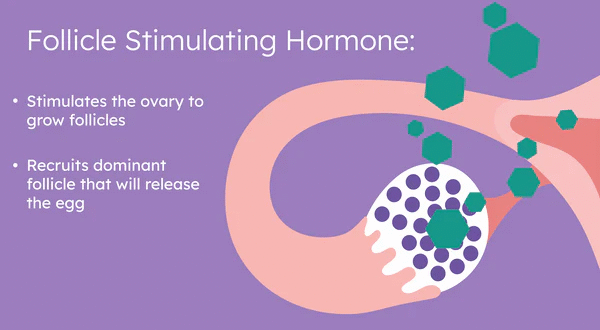Follicle-Stimulating Hormone

Introduction
The human body operates through a delicate balance of hormones, each playing a crucial role in maintaining normal physiological functions. Among these hormones, Follicle-Stimulating Hormone (FSH) is particularly important for reproductive health in both men and women. It is essential for regulating the menstrual cycle, stimulating the growth of ovarian follicles in females, and supporting sperm production in males. When reproductive health issues arise, or when fertility is questioned, one of the most important diagnostic tools is the FSH Test.
At HRTD Medical Institute, we understand the importance of accurate and timely diagnosis in reproductive medicine and endocrinology. That is why we provide state-of-the-art laboratory facilities for hormone testing, including the FSH Test, to help patients and healthcare providers make informed decisions about treatment and lifestyle management. This article provides a detailed, evidence-based discussion about the FSH Test, its purpose, procedure, interpretation, and clinical significance.
What is Follicle-Stimulating Hormone (FSH)?
Follicle-Stimulating Hormone is a gonadotropin produced by the pituitary gland, a small but powerful gland located at the base of the brain. Together with luteinizing hormone (LH), FSH plays a central role in regulating the reproductive processes of the body.
- In women, FSH is responsible for stimulating the ovarian follicles to mature and prepare for ovulation. It also helps regulate the menstrual cycle by influencing estrogen production.
- In men, FSH stimulates the testes to produce sperm and plays a critical role in maintaining overall male fertility.
The amount of FSH circulating in the blood varies depending on age, sex, menstrual cycle phase, and overall reproductive status. Abnormal levels of FSH often point toward underlying conditions related to fertility, menopause, or hormonal imbalances.
What is the Follicle-Stimulating Hormone Test?
The FSH Test is a simple blood test that measures the concentration of Follicle-Stimulating Hormone in the bloodstream. It is often performed as part of a fertility evaluation or when a patient presents symptoms of reproductive or hormonal disorders.
At HRTD Medical Institute, the FSH Test is carried out using advanced biochemical analyzers to ensure precise results. This test can provide valuable information about:
- Menstrual irregularities
- Infertility in both men and women
- The onset of menopause
- Pituitary gland disorders
- Ovarian or testicular dysfunction
Since hormone levels fluctuate, especially in women, the timing of the test is crucial. For women, FSH testing is usually recommended during the early follicular phase (day 2–4 of the menstrual cycle) for accurate interpretation.
Why is the Follicle-Stimulating Hormone Test Important?
The importance of the FSH Test lies in its ability to give doctors a window into reproductive and endocrine health. It can help in:
- Diagnosing Infertility – High or low FSH levels can explain why a couple is having trouble conceiving.
- Assessing Menstrual Disorders – Irregular or absent periods may be linked to abnormal FSH.
- Evaluating Menopause – Women entering menopause typically show elevated FSH levels.
- Identifying Pituitary Problems – Since FSH originates from the pituitary gland, abnormal results may point to gland dysfunction.
- Monitoring Treatment – Patients undergoing fertility treatment or hormone replacement therapy often need FSH testing to monitor progress.
At HRTD Medical Institute, we emphasize the role of the FSH Test as a first step toward tailored treatment strategies, especially in reproductive medicine.
Indications for the Follicle-Stimulating Hormone Test
Doctors may recommend an FSH Test for various reasons. Common indications include:
In Women:
- Difficulty conceiving after 12 months of unprotected intercourse
- Irregular, absent, or painful menstrual cycles
- Suspected polycystic ovary syndrome (PCOS)
- Premature ovarian insufficiency
- Symptoms of menopause (hot flashes, mood changes, irregular cycles)
In Men:
- Low sperm count or poor sperm quality
- Symptoms of low testosterone such as decreased libido, fatigue, or loss of muscle mass
- Suspected hypogonadism
- Delayed or absent puberty
In Children:
- Early or delayed onset of puberty
- Evaluation of abnormal sexual development
Normal Follicle-Stimulating Hormone Levels
The interpretation of the FSH Test depends on age, sex, and reproductive status. Below is a general reference range (values may slightly vary depending on the laboratory):
- Women (follicular phase): 3.5 – 12.5 mIU/mL
- Women (ovulation phase): 4.7 – 21.5 mIU/mL
- Women (luteal phase): 1.7 – 7.7 mIU/mL
- Postmenopausal women: 25.8 – 134.8 mIU/mL
- Men: 1.5 – 12.4 mIU/mL
- Children (before puberty): <4.0 mIU/mL
At HRTD Medical Institute, all hormone test results are interpreted by experienced pathologists and endocrinologists to ensure accurate clinical guidance.
Interpretation of Abnormal Results
High Follicle-Stimulating Hormone Levels May Indicate:
- Ovarian failure or menopause
- Polycystic ovary syndrome (PCOS)
- Turner syndrome or other genetic conditions
- Testicular failure in men
- Pituitary gland tumor or damage
Low Follicle-Stimulating Hormone Levels May Indicate:
- Hypothalamic or pituitary dysfunction
- Stress, weight loss, or malnutrition
- Excess estrogen or testosterone supplementation
- Delayed puberty
Correct interpretation always requires correlation with other hormone tests such as LH, estradiol, testosterone, AMH (Anti-Müllerian Hormone), and prolactin. At HRTD Medical Institute, we often recommend a hormonal profile package for fertility evaluation, which includes FSH along with related hormones.

Follicle-Stimulating Hormone Test in Infertility
Infertility affects millions of couples worldwide, and the FSH Test is one of the most commonly ordered investigations in fertility clinics.
- For women, high FSH may indicate a diminished ovarian reserve, meaning fewer eggs remain in the ovaries. This helps doctors predict the chances of conception naturally or with assisted reproductive technologies (ART).
- For men, FSH levels provide insight into sperm production. Elevated FSH may indicate testicular damage, while low FSH could suggest hormonal imbalance.
At HRTD Medical Institute, our fertility specialists rely on FSH Test results to design personalized treatment plans, ranging from medication to advanced options like IVF (In Vitro Fertilization).
Follicle-Stimulating Hormone Test in Men vs Women
Though the test is the same, the significance of results differs between the sexes:
- In women, FSH reflects ovarian function, menstrual cycle health, and menopausal status.
- In men, FSH is linked to sperm production and testicular health.
This gender-specific interpretation highlights the importance of consulting with specialists. At HRTD Medical Institute, our endocrinologists and gynecologists collaborate to provide comprehensive reproductive care.
The Follicle-Stimulating Hormone Test Procedure
The procedure for an FSH Test is simple and minimally invasive:
- A healthcare professional collects a blood sample, usually from a vein in the arm.
- The blood is sent to the laboratory for analysis.
- Results are typically available within 24 hours at HRTD Medical Institute.
Since FSH levels can fluctuate, your doctor may recommend repeat testing or additional hormone tests to confirm results.
Preparation Before the Test
Most patients do not need special preparation for the FSH Test, but some guidelines include:
- Women should inform their doctor about their menstrual cycle phase.
- Avoid taking hormonal medications (unless prescribed) before the test.
- Inform the doctor about any ongoing fertility treatments.
- Fasting is generally not required.
Our staff at HRTD Medical Institute guide every patient through the preparation steps to ensure accuracy.
Risks and Safety
The FSH Test is safe and carries minimal risks, such as:
- Slight pain or bruising at the needle site
- Mild dizziness in sensitive individuals
At HRTD Medical Institute, our trained phlebotomists ensure a smooth and safe blood collection process.
Accuracy and Reliability
FSH levels can fluctuate depending on age, stress, time of day, and menstrual cycle phase. That is why the test is often combined with other hormone tests for accuracy.
With modern diagnostic equipment, the FSH Test at HRTD Medical Institute provides highly reliable results that healthcare providers can trust.
Cost and Availability in Bangladesh
The FSH Test is widely available across Bangladesh, but the cost may vary depending on the location and laboratory facilities. At HRTD Medical Institute, we maintain affordable pricing without compromising on quality. Patients also receive expert consultation to interpret results and guide further management.
Why Choose HRTD Medical Institute for Follicle-Stimulating Hormone Testing?
There are several reasons why HRTD Medical Institute stands out as a trusted choice for FSH Testing in Dhaka and across Bangladesh:
- State-of-the-art laboratory equipment
- Experienced endocrinologists, gynecologists, and pathologists
- Affordable test packages for fertility and reproductive health
- Fast and reliable reporting within 24 hours
- Patient-centered care with counseling and follow-up services
By choosing us, patients gain access to a complete diagnostic and treatment support system, not just a simple lab result.
FAQs About Follicle-Stimulating Hormone Test
1. Can FSH levels change daily?
Yes. Hormone levels fluctuate, especially in women, depending on the menstrual cycle phase.
2. Is the FSH Test painful?
It is a routine blood test and involves only a minor needle prick.
3. How long does it take to get results?
At HRTD Medical Institute, results are usually ready within 24 hours.
4. Can lifestyle affect FSH levels?
Yes. Stress, smoking, obesity, and poor diet may influence hormone balance.
5. Is the FSH Test enough to diagnose infertility?
No. It must be combined with other hormone tests, imaging studies, and clinical evaluation.
Conclusion
The FSH Test is a vital diagnostic tool in reproductive medicine, helping to identify fertility issues, menstrual irregularities, and pituitary or gonadal disorders. For both men and women, it provides valuable insights into reproductive health and guides treatment decisions.
At HRTD Medical Institute, we combine advanced laboratory testing with expert medical consultation, ensuring patients receive accurate diagnosis and effective treatment plans. Whether you are facing fertility challenges, menstrual problems, or hormonal concerns, our dedicated team is here to help.
By choosing HRTD Medical Institute, you are taking a step toward comprehensive and compassionate healthcare, where your well-being and future are our top priorities
 Pathology Training Institute in Bangladesh Best Pathology Training Institute in Bangladesh
Pathology Training Institute in Bangladesh Best Pathology Training Institute in Bangladesh



